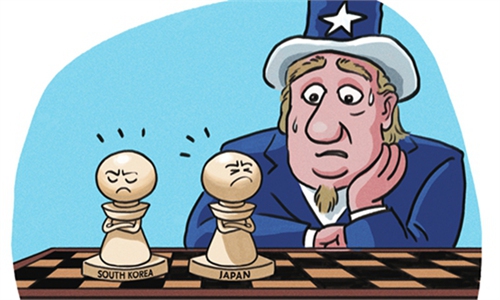
US Defense Secretary Lloyd Austin gets off a plane upon arrival at the US Yokota Air Base in Tokyo on Monday. Photo: AFP
Ahead of US Secretary of State Antony Blinken's and Defense Secretary Lloyd Austin's upcoming "2+2" dialogues with their Japanese and South Korean counterparts from Tuesday to Wednesday, the US has sent some hostile signals, such as saying the US needs to offer "credible deterrence" to China.
Blinken and National Security Advisor Jake Sullivan will meet Chinese chief diplomats in Anchorage, Alaska later this week.
Chinese experts said the US is actually waiting for responses from its allies, to see how much effort its allies could make to serve its strategy to contain China, ahead of the meeting with Chinese senior officials in Anchorage. If US allies don't want to be used by Washington or are unwilling to offend China too much, the tone of US officials in the talks with China from Thursday to Friday could be softer.
According to the US Department of State on Saturday, Austin will discuss enhancing capabilities with Japan and South Korea. "China is our pacing threat," US defense secretary told reporters travelling with him. "Our goal is to make sure that we have the capabilities and the operational plans and concepts to be able to offer credible deterrence to China or anybody else who would want to take on the US."
Chinese Foreign Ministry spokesman Zhao Lijian responded to Austin's remarks at a routine press conference on Monday, saying that China's development will increase the forces of peace in the world, which is an opportunity for the world, not a threat.
"What China has always safeguarded is the international order with the UN at its core, with international law as its foundation, rather than the 'international order' defined by any specific country to protect its own hegemony," Zhao said.
In the era of globalization, the real damage to the international order is to form cliques based on ideology, and to target other countries, and this won't win any support and has no way out, Zhao noted.
"China's definition of the international order would be more welcomed in the region. The Quad mechanism consisting of the US, Japan, Australia and India has four countries. Most countries in the region have not been included," said Lü Xiang, an expert in US studies with the Chinese Academy of Social Sciences.
Many US allies or partners have already been used by the US to confront China in the past few years, such the Philippines, Australia and India, and they were trying to please the US to gain more support by being aggressive against China, and they have all paid the price, said Chinese analysts.
The US has failed to compensate for its allies' losses in confrontations with China, and China's development has not been interrupted either, so these countries in the region are not stupid, and they know they will be pressured by the US and used again, Lü told the Global Times on Monday.
Austin also plans to visit India after Japan and South Korea to discuss cooperation on the Indo-Pacific strategy, while Blinken will fly to Alaska for the meeting with Chinese chief diplomats.
Lü said the talks in Tokyo and Seoul will affect the US tone in Alaska, as Blinken will adjust his negotiating tactics with China based on the reactions from Japan and South Korea, but unfortunately, Japan and South Korea might not share US' concerns or anxiety about China since they share more common interests with China in the fields of economy and trade.
Song Zhongping, a Chinese military expert and TV commentator, said the "credible deterrence" mentioned by Austin normally means anti-missile systems, US military bases in the region and efforts made by US allies, and its allies in the region have different concerns, which makes Washington unable to form a solid anti-China alliance.
"China is the biggest hope for South Korea and Japan to realize their economic recoveries, and India is becoming calm after a series of border conflicts. They will be reluctant to unconditionally serve the US' strategic purpose," Song noted.
What US allies want from the US is the commitment for protection, so they can have more bargaining chips to deal with China, but they dare not confront China for the US, experts said.
Military cooperation that the US wants to realize such as deploying intermediate-range missiles would be too dangerous to be accepted, because US allies know that they would become potential strike targets for China, Russia and North Korea if they agreed to the deployment of US ballistic missiles, experts said.
"In other words, ideology and values are not enough for the US to gather its allies, so it's considering how to make the full use of sovereignty disputes, such as the Diaoyu Islands between China and Japan, as well as the China-India border dispute," Song said.
China doesn't need to be too worried about the Biden administration's "America is back" diplomatic theme and the so-called Indo-Pacific strategy, as long as the country can focus on development to offer a stable and safe market with great potential for the world while the People's Liberation Army can keep focusing on combat readiness to impose deterrence to any foreign force that dares to challenge China's core interests, said experts.


